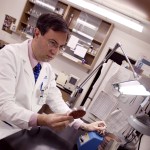A new study by Emory University public health researchers finds that outpatient treatment for chronic diseases such as diabetes, hypertension and kidney disease are to blame for the recent rise in Medicare spending. Kenneth Thorpe, PhD, chair, Health Policy and Management, Rollins School of Public Health, presented study findings today at a briefing of the National Press Club in Washington, DC.
The report, “Chronic Conditions Account for Rise in Medicare Spending from 1987 to 2006,†was published Feb. 18 by the journal Health Affairs.
Thorpe and colleagues analyzed data about disease prevalence and about level of and change in spending on the 10 most expensive conditions in the Medicare population from 1987, 1997 and 2006.
Among key study findings:
- Heart disease ranked first in terms of share of growth from 1987 to 1997. However, from 1997 to 2006, heart disease fell to 10th, while other medical conditions – diabetes the most prevalent – accounted for a significant portion of the rise.
- Increased spending on diabetes and some other conditions results from rising incidence of these diseases, not increased screening and diagnoses.









